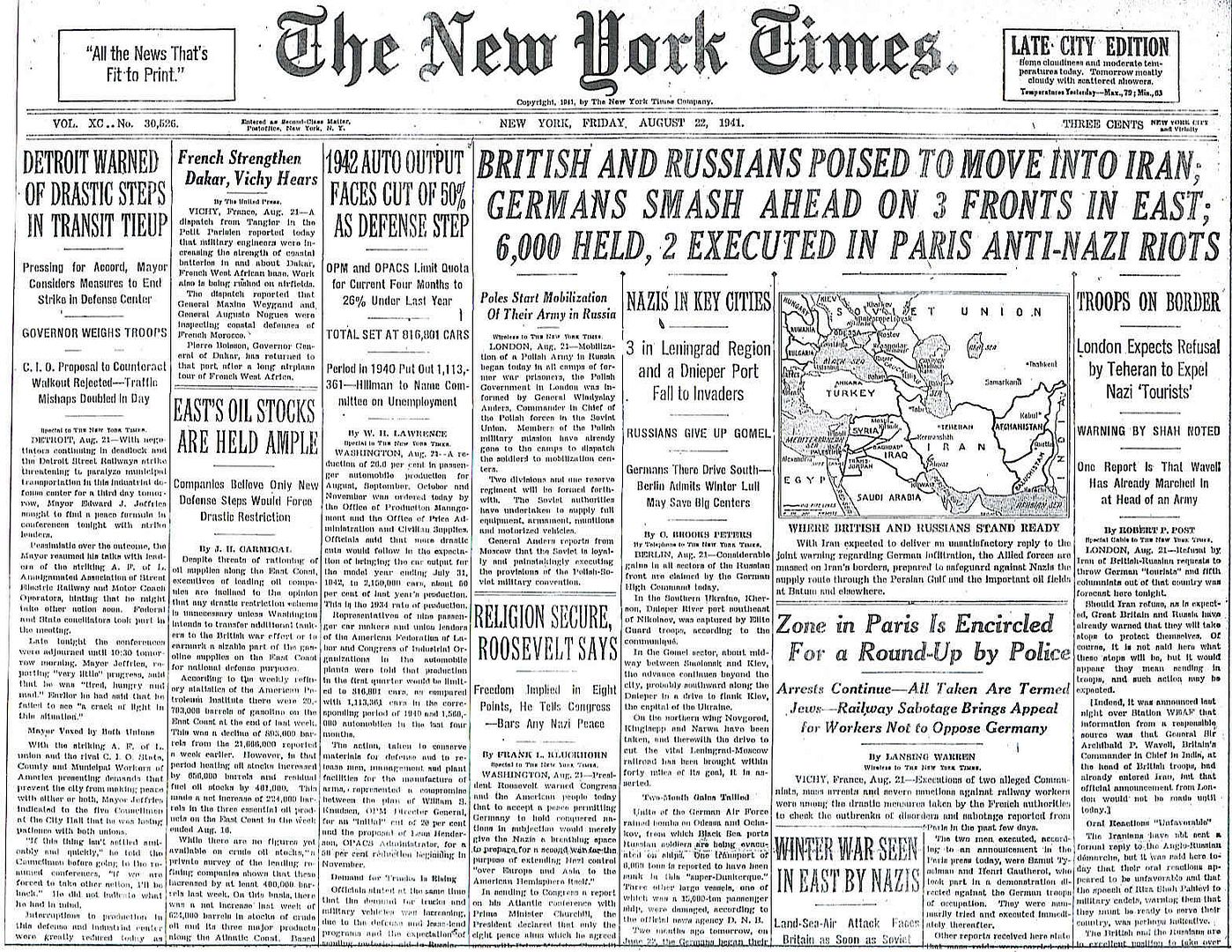
Posted on 08/22/2011 4:42:43 AM PDT by Homer_J_Simpson

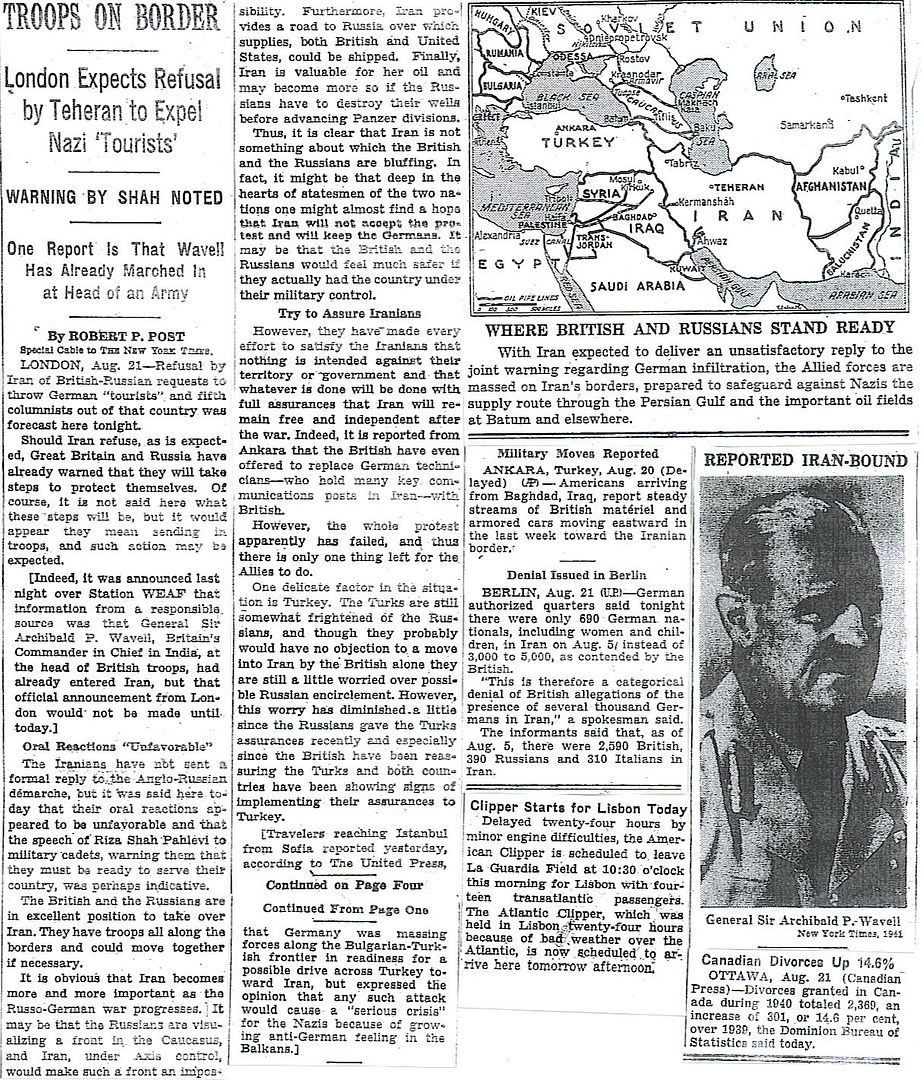
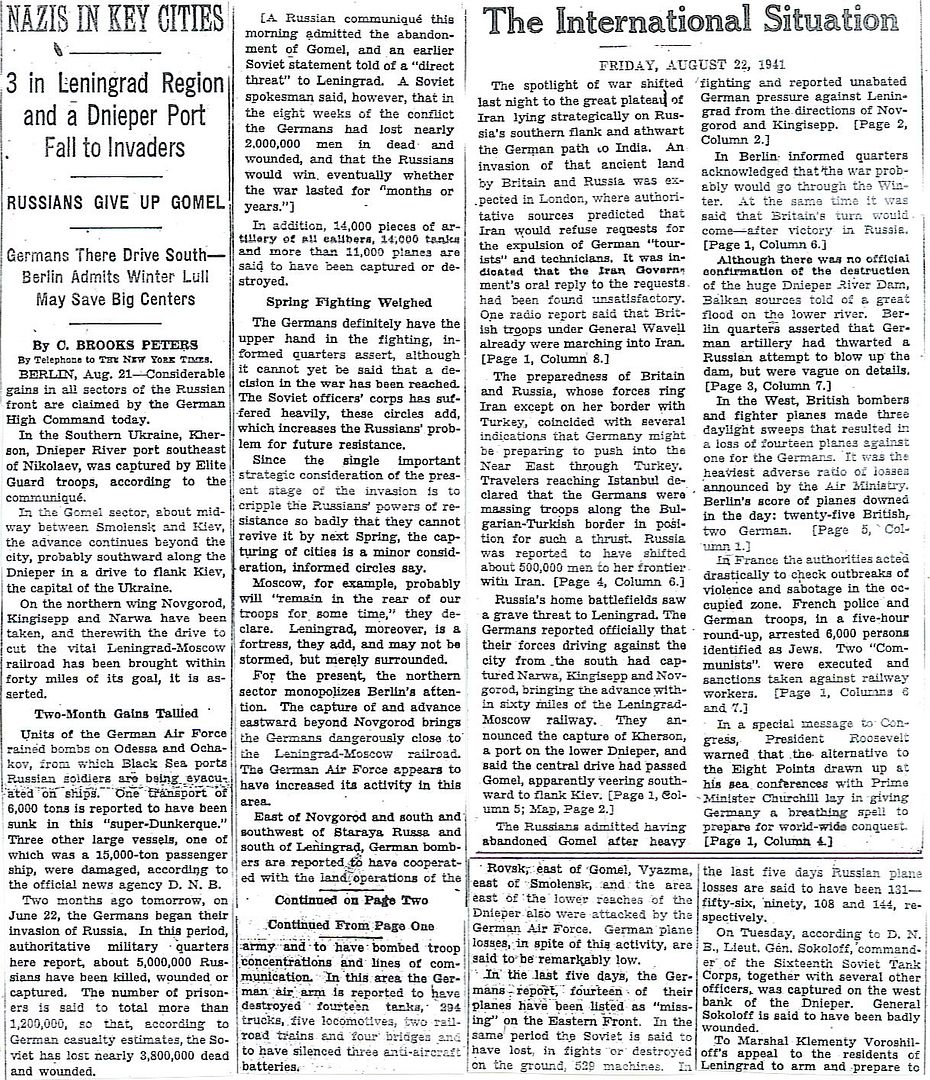
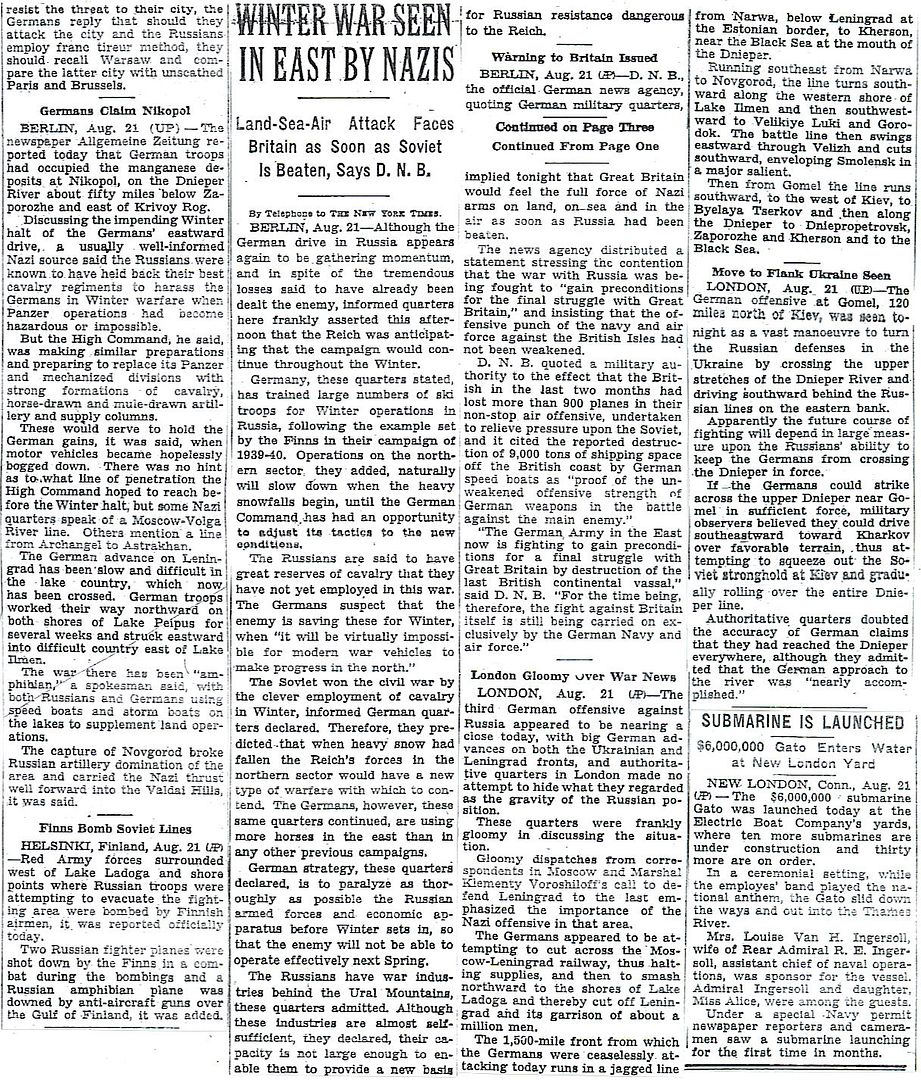
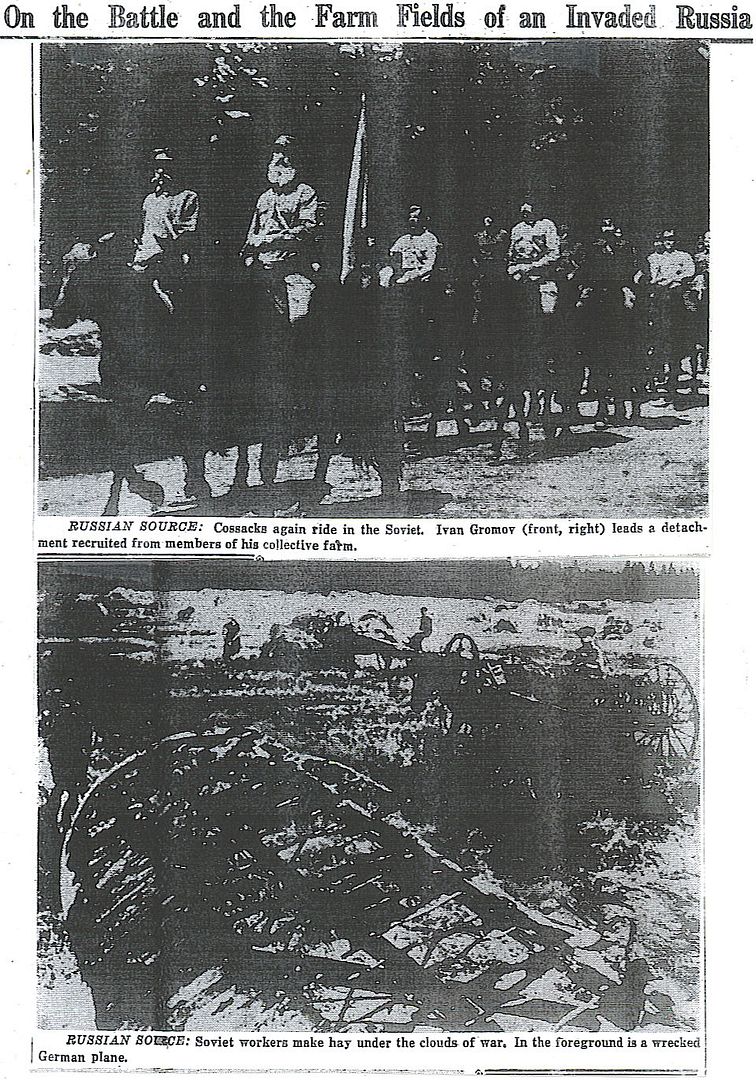
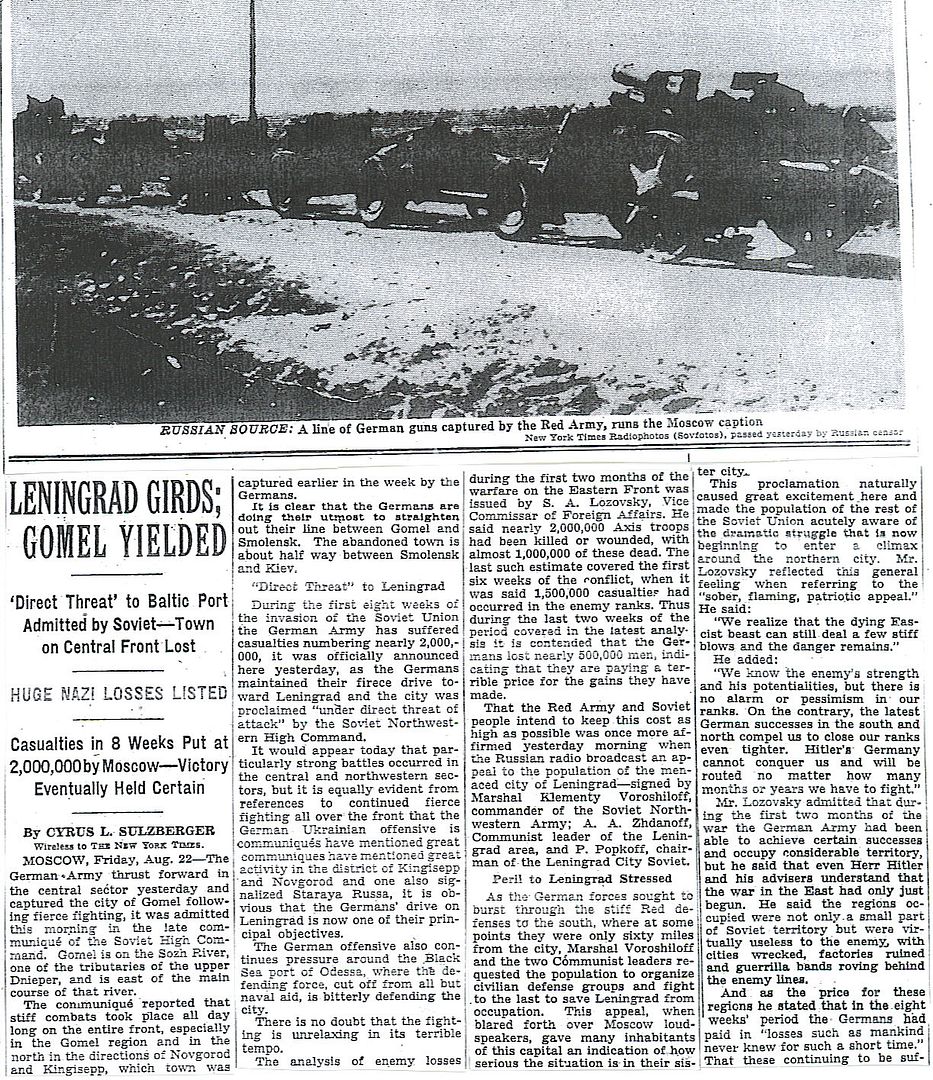
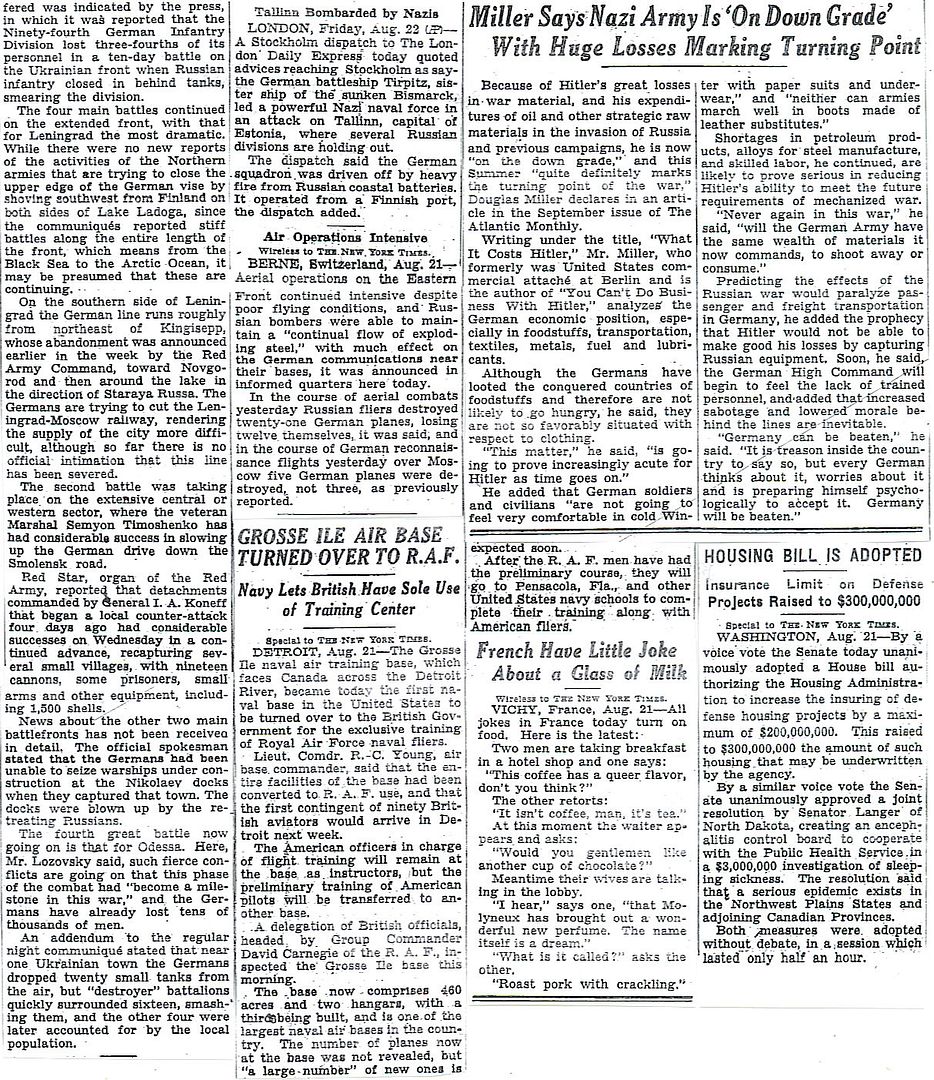
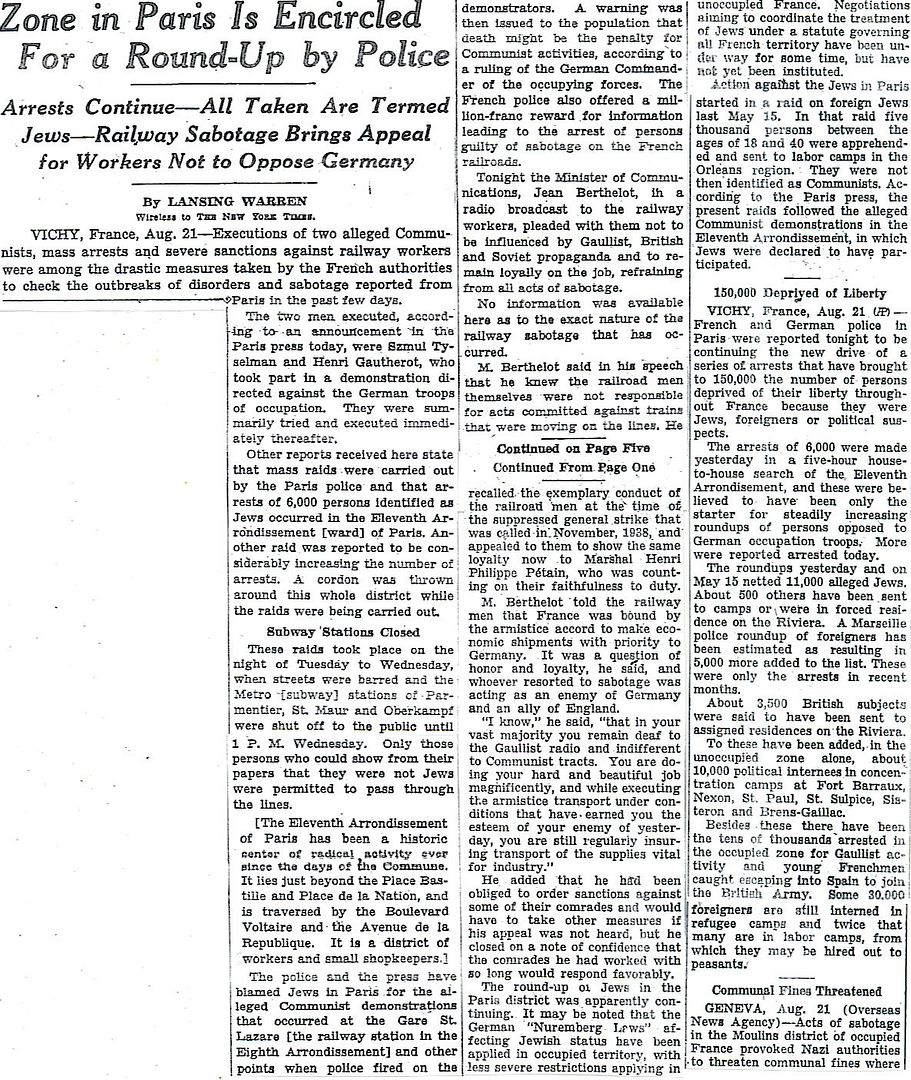
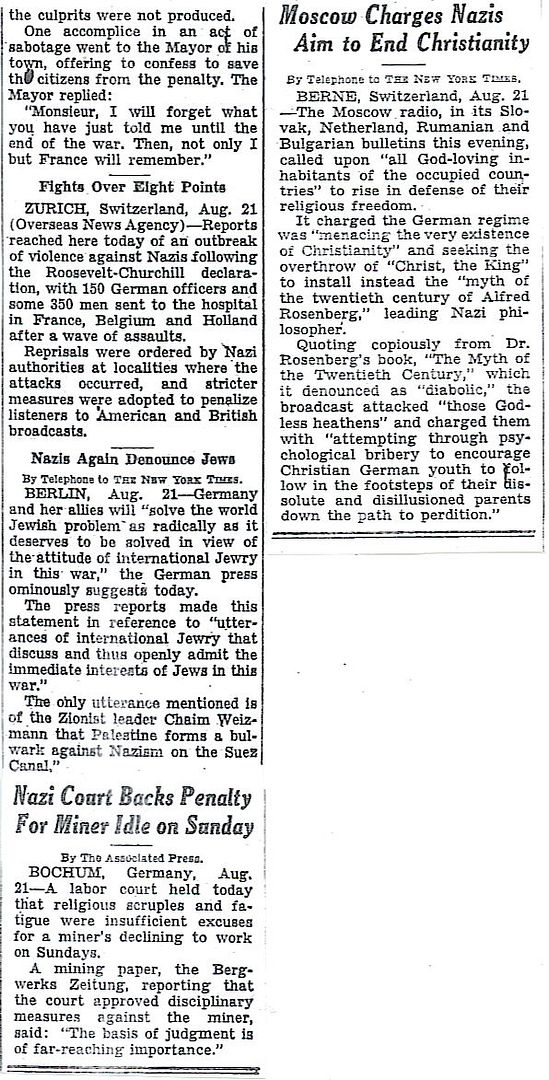
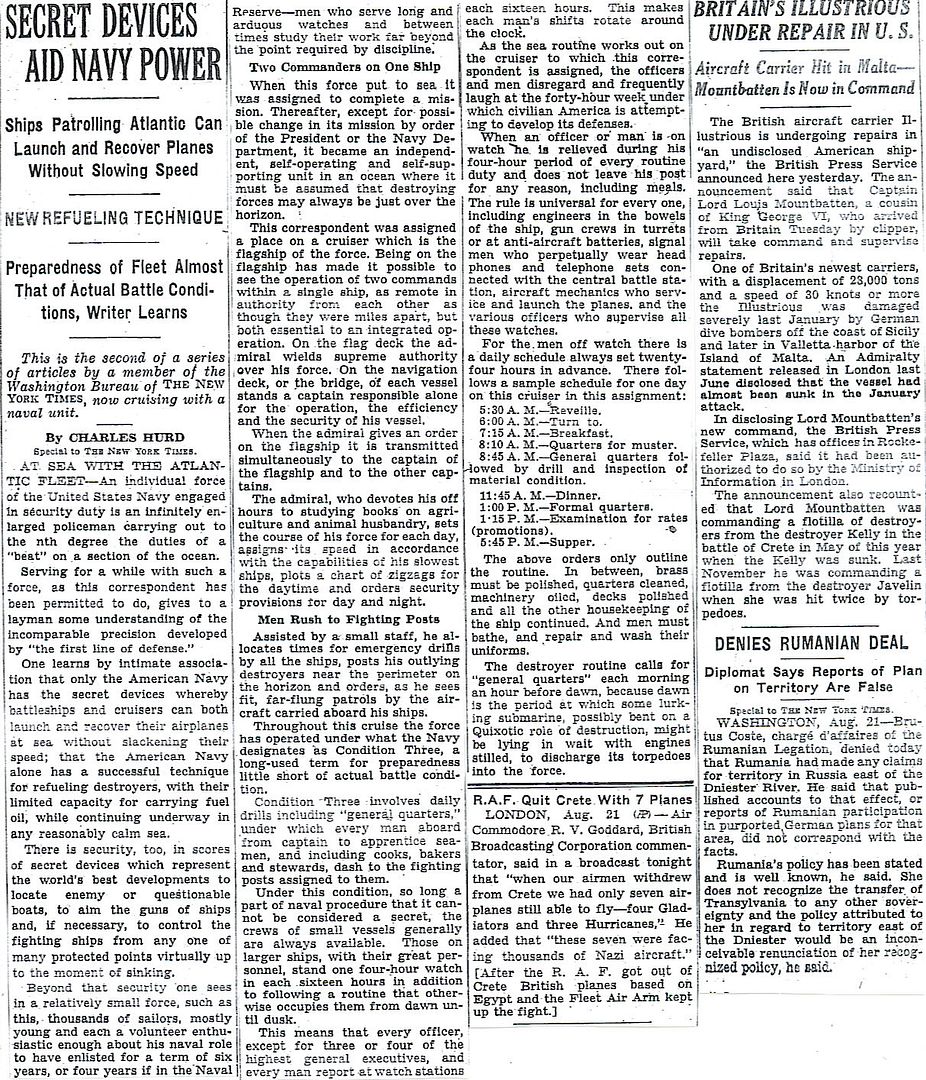
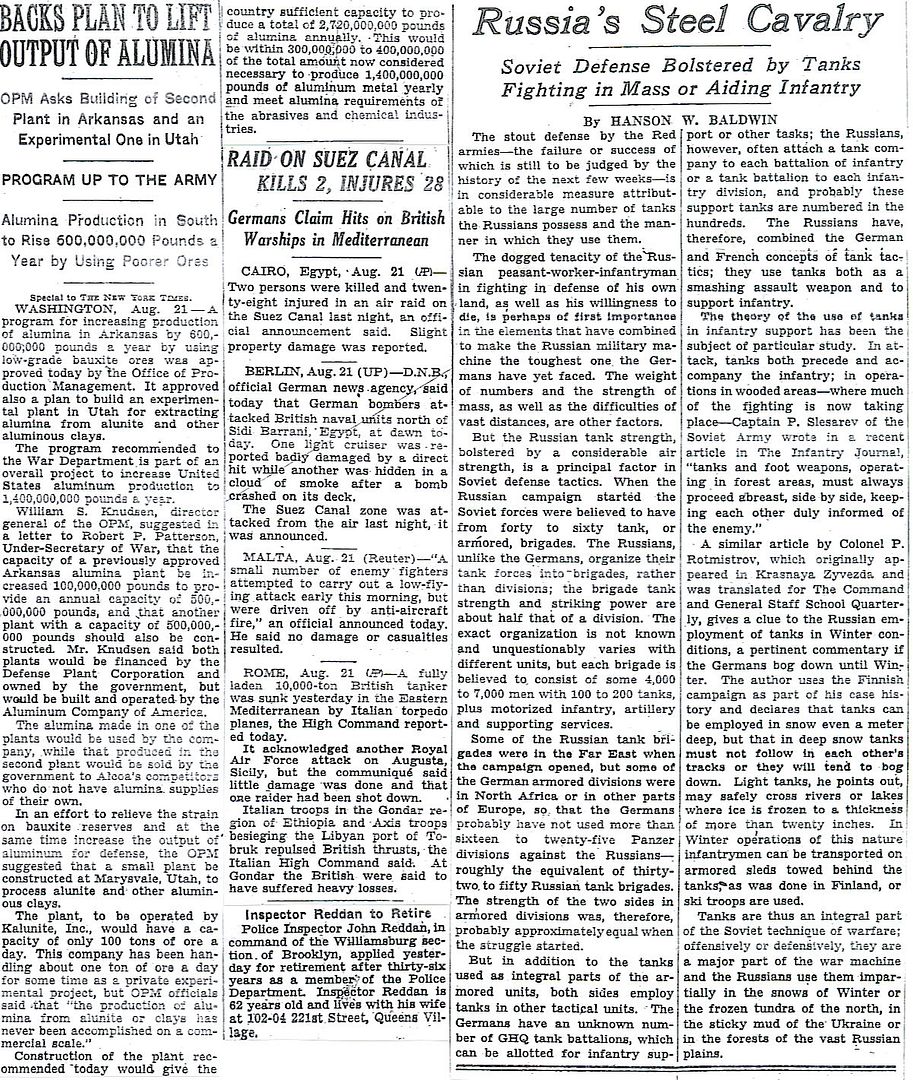
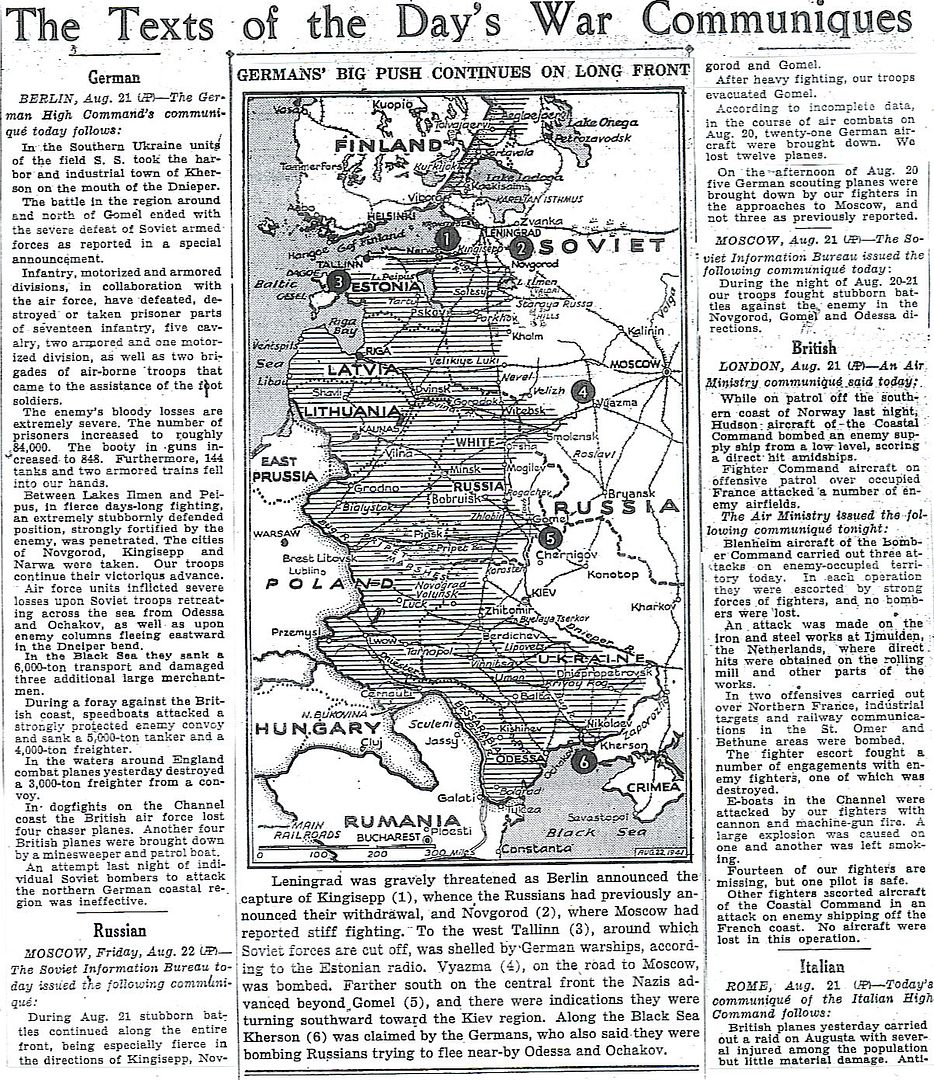
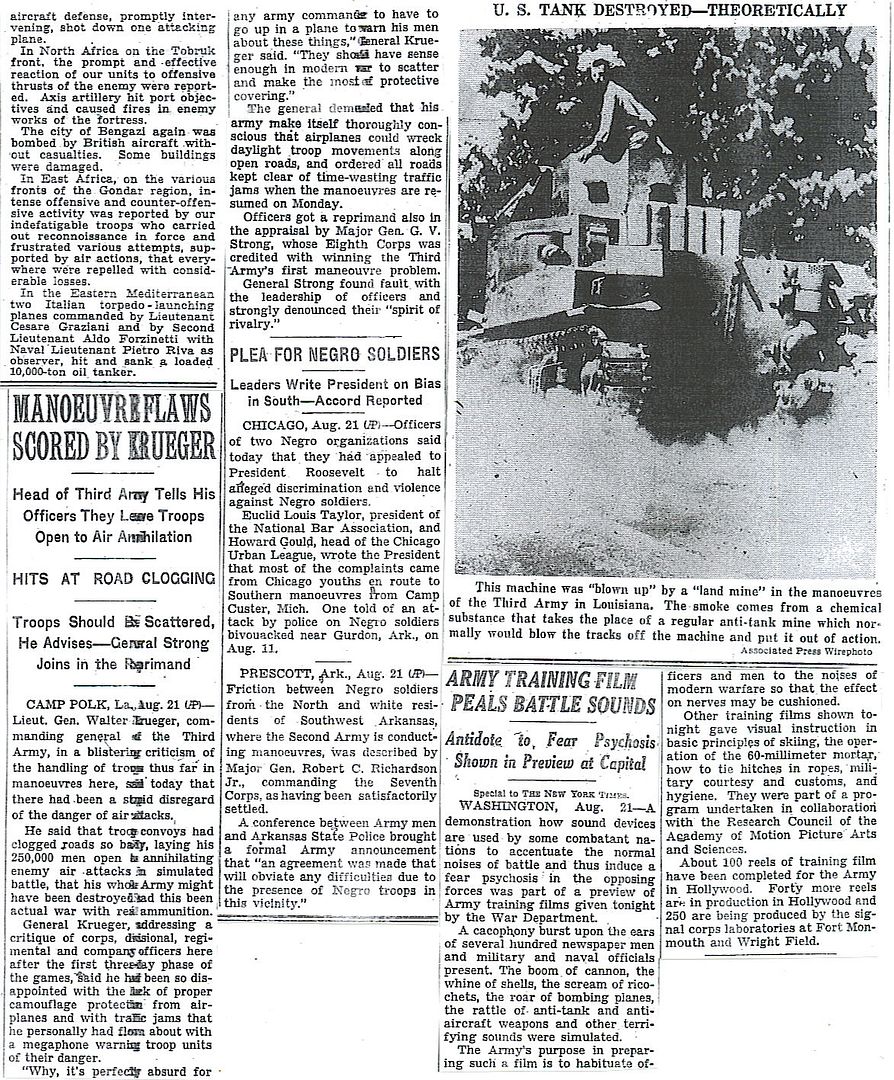
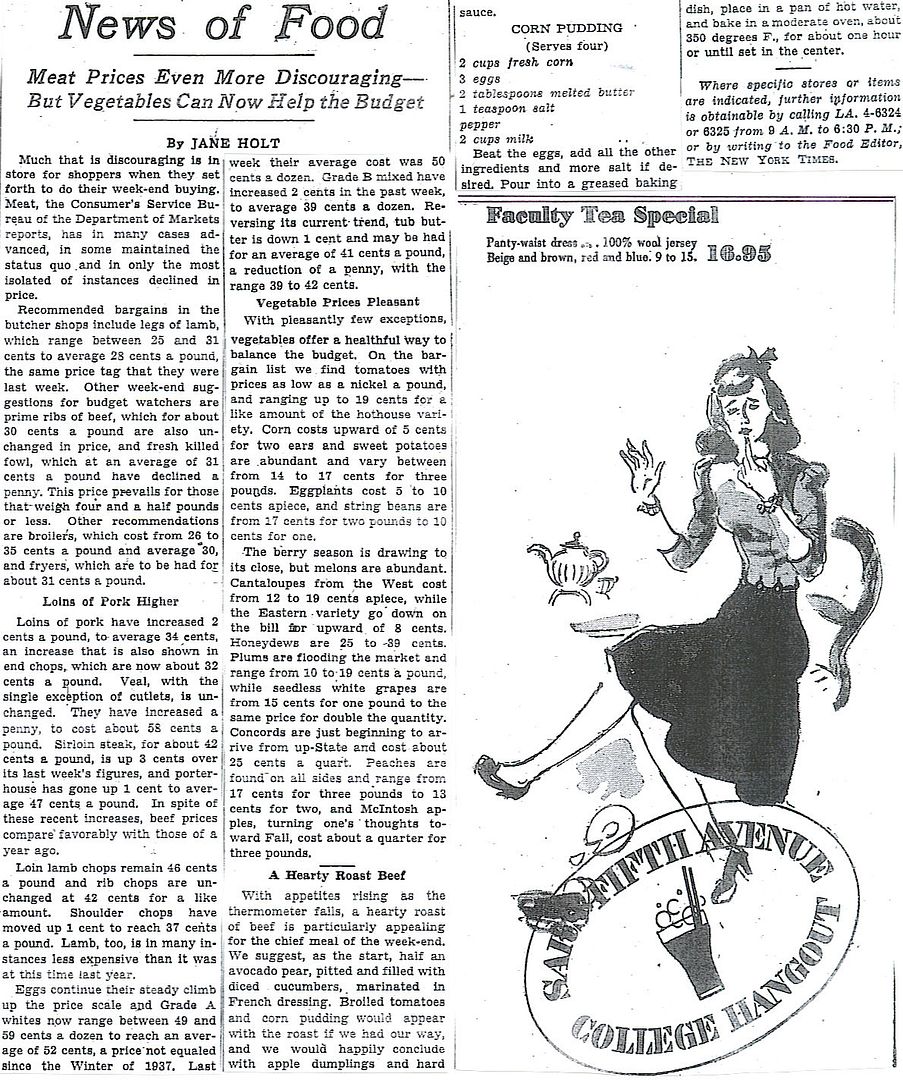
* I always thought panty-waist was just an old-fashioned name for a girly-man. The Saks Fifth Avenue ad on this page tells me it has another meaning. Mrs. Homer wonders – what defines a dress as a panty-waist? Anyone know?
http://www.onwar.com/chrono/1941/aug41/f22aug41.htm
Germans threaten to kill French hostages
Friday, August 22, 1941 www.onwar.com
In Occupied France... German authorities in Paris threaten to shoot hostages if attacks on German troops continue. About 20,000 German troops are engaged in searches in the city for suspects.
http://homepage.ntlworld.com/andrew.etherington/month/thismonth/22.htm
July 22nd, 1941
UNITED KINGDOM: Minesweeper HMS Ardrossan launched.
Destroyer HMS Cowdray launched.
Corvette HMS Fritillary launched. (Dave Shirlaw)
GERMANY: Berlin: The German News Bureau (DNB) reported:
On Sunday night through to Monday morning the German Luftwaffe launched its first grand assault on the Soviet capital. A responsible authority in Berlin confirms that large numbers of bombers wings mounted an extremely vigorous attack. The raids continued for several hours without let-up, we believe from sunset until dawn. the German aerial attack on Moscow appears to confirm that the German Luftwaffe has now been successful in setting up takeoff bases inside the conquered Russian territories. These bases are well situated for its bomber missions so that the bombers are now only a few hundred miles from Moscow and can make intensified attacks on the Soviet capital.
The Wehrmacht High Command announced:
The breakthrough operations of the German Wehrmacht and its allies have broken the Soviet defensive front into disconnected groups. Despite tenacious local resistance and dogged counter-attacks, any unified conduct by the enemy is no longer discernible. Operations to smash and annihilate the individual Soviet armed forces groups, are continuing without let-up along the entire Eastern Front. Last night the Luftwaffe attacked Moscow for the first time in retaliation for the Bolshevik air raids on the open capital cities of our allies, Bucharest and Helsinki. Strong German bomber formations with good ground visibility made relay bombing raids on military installations in the Soviet Russian communications and munitions centre in Moscow. Direct bomb hits started countless conflagrations and wide-spreading fires in the Kremlin district and around the Moskva river bend. High ranking Soviet headquarters buildings and government offices have been destroyed or badly hit, as have supply factories.
U-450 laid down.
U-117, U-171 launched. (Dave Shirlaw)
U.S.S.R.: The Axis armies pause in their advance, having conquered 700,000 square miles of Russian territory.
Moscow: The Soviet Information Bureau reported:
Yesterday evening Moscow experienced its first air attack of the war. The sirens sounded at 10:00 P.M. after lookout men had reported more than 200 German bombers flying toward Moscow. Soviet night interceptor planes and antiaircraft batteries went into action and succeeded in forcing the bulk of the attackers to turn back before reaching the capital. Only isolated German-Fascist aircraft succeeded in breaking through and released a number of bombs that destroyed dwellings or set them on fire, but no military targets were hit. There were several dead and injured. Night interceptors and anti-aircraft guns destroyed 17 German aircraft.
FINLAND: While the Finnish attack in Karelia is in progress (often against heavy Soviet resistance), Colonel Ruben Lagus, the commander of the 5th Div., is nominated the first recipient of a new decoration, the Mannerheim Cross (2nd class). (Mikko Härmeinen)
MEDITERRANEAN SEA: Italian planes locate part of the Convoy of Operation Substance which left Gibraltar yesterday. The Italian Fleet stays in port, expecting a ferry flight of aircraft to Malta.
The Italian sub Alagi heard the convoy of Operation Substance but could not attack while the sub Diaspro fired 4 torpedoes to the Ark Royal and HMAS Nestor but missed. 8 SM79s torpedo bombers and 15 bombers (SM79 and Cant Z1007) take off from Sardinia to attack the convoy but failed to find it. (Andrea Galliano)
EGYPT: Cairo: Lyttleton makes several concessions to de Gaulle. General Dentz and several Vichy French officers should be segregated, if necessary, in Palestine; that the British government should not intervene in political and administrative affairs in Syria; and that it would ‘protect the historical interests of the French in Syria.’ de Gaulle proposes a new application of the armistice convention. He also suggests that the British should limit themselves to ‘the military operations against the common enemy.’ Lyttleton agrees on behalf of the British.
JAPAN: Tokyo: The new foreign minister, Teijiro Toyoda, reaffirms Japan’s alliance with Germany and Italy.
CANADA:
Corvette HMCS Brandon commissioned. (Dave Shirlaw)
U.S.A.: Destroyer USS Harding laid down. (Dave Shirlaw)
I’m probably going to be in the minority here, but I happen to agree with Hitler’s decision for the Kiev encirclement. The German Army had too few reserves to cover the right flank of AG Center on a drive to Moscow, and the left flank of AG South, while Halder pursued his Moscow operation; especially when one considers the number of troops available to the Soviets for operations on interior lines between the two Army groups if left largely ignored.
Kiev allows the Germans to shorten their lines, creating reserves from troops used to guard the flanks, without recourse to their other reserves, liquidates a larger body of Soviet troops, making them unavailable for future Soviet operations, and gives the Germans the Donbass, Ukraine’s agriculture, and a continuous front.
In my opinion, Hitler’s mistake was allowing Halder and Brauchitsch to talk him into Typhoon AFTER the encirclement. The Germans should have begun preparing defensible positions [as Rundstedt subsequently did at the Mius-which held for the winter],coupled with small scale operations, and suspended major operations until 1942 [allowing for rest, refit and reinforcement].
Just sayin’.
Turns out Miller was right on the money.
I think the Germans should have done everything to take Moscow, for the psychological reasons, and also for real possibility that losing Moscow may very well have lead to the downfall of Stalin and with it, the entire Communist infrastructure. Not to say the Russians wouldn’t have kept fighting, but it may very well have been under non-Communist commanders.
Except: [1] the Russians evacuated most of their government before the Germans actually did reach Moscow, [2]The principal reason for going for Moscow [militarily] was as a rail/ commo center. The Germans could have used air power to neuter it [and Lenigrad was cut off], and [3] The little problem of divided fronts, overextended flanks and large bodies of enemy troops on those flanks doesn’t go away.
And bear in mind, Hitler was merely ordering his Army to conform to the objectives set forth in BARBAROSSA. The disproportion of forces between AGs North, Center and South was Halder’s doing. Mosocw was his objective from Day 1, not Hitler’s.
No, but thanks for the heads’ up. I used to play the old AVALON HILL game STALINGRAD [we modified the rules a bit to get the Germans over the border], bu not computer games. How is it?
That is true, but Stalin knew how psychologically important it was for him to stay in Moscow. So even he knew that should Moscow fall, it would have had dire consequences for him personally.
"Joining his colleagues Burton Wheeler and Champ Clark in condemning Jewish influence in Hollywood, Senator Gerald Nye of North Dakota zeroed in on the "Yiddish controllers" of American theater and movies.
Nye was adamant that the United States should stay out of the war and not allow the Jews to drag America into the conflict.
Hollywood films, he believed, were swaying American public opinion to the interventionist point of view."
"A German Army patrol searches "suspicious" civilians in Baranovichi, Belorussia.
The faces of the German officer and his men reveal that they are enjoying exercising their power of life and death over civilians.
At first, orders emanating from Berlin required German Armed Forces to execute Communists, partisans, and Jews.
Unlike these other categories of people to be killed, Jews were on the death list not because of anything they did, but simply because they were born Jews."
dfwgator: "I think the Germans should have done everything to take Moscow, for the psychological reasons..."
Given the circumstances, I'd agree with PzLdr.
But what I've always thought is, why didn't the Germans put their major FIRST effort into taking Leningrad, then use that city and it's seaport as a base of operations for the assault on Moscow, and the encirclement of major Soviet formations?
Surely in 1941, Leningrad was relatively easy pickings, and would have relieved many of the Germans' supply problems.
Sounds like a regular Lord Haw Haw.
General Hubicki, Commander of 9th Panzer-Division (with glasses),working with his headquarters staff.
On 13th September the 16th Panzer Division stormed Lubny.
The town was defended by anti-aircraft units and workers' militia, as well as formations of the NKVD, Stalin's secret police. The 3rd Company of the Engineers Battalion, 16th Panzer Division, captured the bridge over the Sula in a surprise coup. Using "Stukas on foot"—howling smoke mortars—they confused and blinded the Russians and in a spirited assault took the suburbs of the town. Behind them came the 2nd Battalion, 64th Rifle Regiment.
Savage street fighting developed. The Soviet commander in the field had called the entire Russian civilian population to arms. Firing came from roofs and cellar windows. Behind barricades combat units armed with Molotov cocktails pelted the tanks. The eerie fighting continued throughout the day.
On 14th September, a Sunday, 79th Rifle Regiment joined action. In the afternoon Lubny was in German hands. By the evening the division's reconnaissance detachment was still 60 miles away from the spearheads of 3rd Panzer Division.
The Russians meanwhile had realized their danger. Aerial reconnaissance by the German Second and Fourth Air Fleets reported that enemy columns of all types were on the move from the Dnieper front against Guderian's and Kleist's formations, in the direction of the open gap. That gap had to be closed unless large parts of the Soviet forces were to get away.
Striking from the north, Guderian's divisions had taken Romny and Priluki. Model, with a single regiment, was struggling over muddy roads to Lokhvitsa. The rest of the division was still stuck in the mud a long way back. Major Pomtow, the chief of operations of 3rd Panzer Division, was tearing his hair. There was still a gap of 30 miles between the two Panzer Groups. A 30-mile-wide loophole. Russian reconnaissance aircraft were circling over the gap, directing supply columns through the German lines. Hurriedly assembled groups of tanks were moving ahead to clear a path for them. General Geyr von Schweppenburg at his advanced battle headquarters suddenly found himself under attack by one of these Russian columns trying to break through the German ring. The headquarters turned itself into a strongpoint. An SOS was sent to 2nd Battalion, 6th Panzer Regiment. But they were still 12 miles away.
In the nick of time Lieutenant Vopel's 2nd Company succeeded in snatching the general commanding XXIV Panzer Corps from almost certain death. The offensive towards the south continued.
The time was 1200 hours, the scene a muddy road near Lokhvitsa.
"First Lieutenant Wartmann to the commander!" The order was passed on through the column. Wartmann, commanding a tank company, waded through the mud to the command tank of Lieutenant-Colonel Munzel, the new OC 6th Panzer Regiment. A quarter of an hour later the tanks started up their engines and the armored infantry carriers of 3rd Platoon, 1st Company, 394th Regiment, under Sergeant Schroder, moved over to the right to make way for the tanks. The tankmen removed the camouflage from their vehicles: Lieutenant Wartmann was organizing a strong detachment for a reconnaissance towards the south. His orders were: " Drive through the enemy lines and make contact with advanced formations of Kleist's Panzer Group."
At 1300 hours the small combat group passed through the German pickets near Lokhvitsa. Stukas escorted them for a short distance. The sun shone down from a cloudless sky. The undulating country stretched far to the horizon. In front were the dark outlines of a wood. They had to pass through it. Suddenly a hastily retreating Russian column crossed their path—supply vehicles, heavy artillery, engineering battalions, airfield ground crews, cavalry units, administrative services, fuel supply columns. The vehicles were hauled by tractors and horses. They carried drums of petrol and oil.
"Turret one o'clock. H.E. shells. Fire!" The fuel vehicles burned like torches. The horses broke loose. The Russians scuttled into the forest and behind the thatched farmhouses of a village. There was chaos on the road. The German detachment moved on.
Their job was not to fight the enemy, but to make contact with the forward units of Army Group South.
They were still in radio contact with Division. There Major Pomtow was sitting next to the radio operator, intently following the recce unit's report on enemy dispositions, terrain, and bridges. Pomtow read: "Stiffening enemy opposition." Then there was silence. What had happened?
From Wartmann's tank, meanwhile, the situation looked like this. Horse-drawn carts and tractors were standing on the road, abandoned. Machine-gun and anti-tank fire was coming out of sunflower fields. Wartmann halted his tanks. He looked through his binoculars. A windmill on a near-by hill caught his attention. It was behaving rather strangely: one moment its sails would go round one way and then again the other way. Then they would stop altogether. Wartmann let out a soft whistle. Clearly an enemy observer was there, directing operations. "Tanks forward!" A moment later the 5-cm. shells slammed into the windmill. Its sails turned no longer.
Forward.
Pomtow's radio operator, earphones clamped on his head, was writing: "1602 hours. Have reached Luka, having crossed Sula river over intact bridges." Pomtow was smiling. That was good news. Wartmann's detachment moved on—through uncanny terrain with deep sunken lanes, swamps, and sparse forest. Whichever way he turned he saw enemy columns.
Wartmann's tanks had covered 30 miles. The day was drawing to its end. Suddenly radio contact was lost. Over to the south the silhouette of a town could be made out against the evening sky. That no doubt was Lubny, the area where 16th Panzer Division was operating. They could hear the noise of battle. Evidently they had got close to the fighting lines of the southern front. But which way was the enemy? Was he in front or were they about to run into his flank?
Cautiously the armored scout cars accompanying the tanks picked their way across a vast cornfield with the harvested grain piled in stocks. They dodged from one stock to the next. Suddenly an aircraft appeared overhead.
"Look—a German reconnaissance plane!"
"White Very light!" Wartmann commanded.
With a whoosh the flare streaked up from the turret of the tank. White signals always meant: Germans here. A tense moment. Yes, the plane had seen it. He dipped down low. He circled. He circled again. "He's touching down!" And already the machine was rolling to a stop among the stooks in the cornfield—right among the enemy lines. There was much laughter and handshaking.
Today nobody knows who those three resolute airmen were. They informed Lieutenant Wartmann about the situation on the front: less than six miles away were units of Kleist's 16th Panzer Division. A moment later the aircraft took off again.
Wartmann's men could see it dip down low beyond the wide ravine, dropping a message. "Tanks forward!" On they went. Through the ravine and up the far bank.
Infantry in field grey were scrambling up the slope in battle order. "White Very lights!" Wartmann ordered for the second time that day. At once the reply came—also in white. The men shouted with joy and flung up their arms. They were the 2nd Company of the Engineers Battalion, 16th Panzer Division, under First Lieutenant Rinschen. The two officers shook hands among scenes of enthusiasm. Their handshake meant that the trap 130 miles to the east of Kiev had now been closed, even though so far only symbolically.
At Model's headquarters the radio suddenly sprang into life again. "Connection re-established!" the operator shouted. Then he listened. Five minutes later the chief of operations dictated to his map draftsman the following entry, to be placed next to a tiny blue lake:
"14th September 1941, 1820 hours: link-up of First and Second Panzer Groups."
In the orchard outside the headquarters of 2nd Panzer Regiment the tanks and troop-carriers with the white G and the white K were standing next to each other, well camouflaged under trees and hedges. The sky was alive with the flashes of the artillery and the howling of mortar salvos. The curtain was being rung up on the last act of the greatest battle of encirclement in military history.
The very next day the 9th Panzer Division with units of 33rd Panzer Regiment, having moved north on the road east of the Sula river after the capture of Mirgorod, linked up with the most forward parts of 3rd Panzer Division by the bridge of Sencha. Now the ring was properly closed and the trap shut behind fifty enemy divisions.
There was more fierce fighting to come with the encircled armies, as well as with the forces employed by the Soviet High Command from outside with the intention of saving Budennyy.
There were some critical situations, especially along Guderian's extended eastern flank. Near Romny on 18th September an attack from the flank launched with four divisions against the German 10th Motorized Infantry Division and a few AA batteries got within 900 yards of Guderian's observation post up on the tower of the town gaol, and was halted only with great difficulty.
At Putivl the cadets of Kharkov stormed singing against the positions of 17th Panzer Division and the "Grossdeutschland" Motorized Infantry Regiment. They were killed to the last man. Near Novgorod Severskiy six Soviet divisions, supported by armored formations, pounced on the combat-hardened 29th Motorized Infantry Division.
But it was all in vain. The Russian attacks were not aimed at a single focus. They caused some critical situations, but they did not turn the tide. The Russians did not succeed in denting Guderian's 155-miles-deep flank even at a single point. On 19th September Sixth Army Infantry—more particularly, divisions of XXIX Army Corps—took Kiev. By 26th September the great battle was over. Five Soviet Armies had been smashed completely, and two more badly battered. One million men had been killed, wounded, scattered, or taken prisoner. Marshal Budennyy, Stalin's old comrade-in-arms and once a sergeant in the Tsarist Army, had been flown out of the pocket on top-level orders. Stalin did not want this hero of the Revolution to fall into German hands or to be killed. Budennyy's command was taken over again by Colonel-General Kirponos. He was killed in action, together with his Chief of Staff, Lieutenant-Général Tupikov, while trying to break out of the ring.
In figures the balance of the battle was as follows: 665,000 prisoners, 3718 guns, 884 armored fighting vehicles, and a vast quantity of other war material. One single Panzer Corps, General Kempf's XLVHI Corps, which had its three divisions engaged right at the centre of this vast battle of annihilation, alone took 109,097 prisoners—more than the total number of prisoners taken in the battle of Tannenberg in the First World War.
The numerical scale of the battle was unprecedented in history. Five Armies had been destroyed. The reason for this victory was superior direction of operations on the German side, the daring mobility of German units, and the toughness of the troops. It was a tremendous defeat for Stalin.
When Guderian questioned Potapov, the forty-year-old Commander-in-Chief of the Soviet Fifth Army, who had been taken prisoner by Model's Panzerjagers, why he had not evacuated the Dnieper bend in good time, the Russian general replied, "Army Group had issued orders for the evacuation. We were, in fact, withdrawing towards the east when an order from the highest quarters—this means Stalin—instructed us to turn back and fight, in accordance with the slogan: 'Stand fast, hold out, and if need be die.' "
Potapov spoke the truth. On 9th September Budennyy had issued orders for preparations to be made for a withdrawal and requested Stalin to agree to his abandoning Kiev and the Dnieper bend. But the dictator had thrown a fit of temper and had issued his famous Stand-fast-and-die order.
Stand fast and die! That order had cost a million men. It had cost the whole of the Ukraine. Now the road to the Crimea and the Donets basin was open. Stalin's mistake and stubbornness had terrible consequences—all but fatal consequences. Yet, in retrospect, it may well be that this mistake resulted in Russia's victory. The rapid progress of the campaign and his belief in the accomplished strategic surprise and in the invincibility of German arms produced in Hitler that spiritual pride which was to lead presently to a string of fateful mistaken decisions. The first great mistake that sprang from the victory at Kiev was Hitler's conclusion that the Russians in the south were no longer able to build up a serious line of defense. He therefore ordered: "The Donets basin and the Don are to be reached before the onset of winter. The blow at the Soviet Union's industrial heart must be struck swiftly."
Hitler was anxious to gain the Soviet Union's industrial heart as soon as possible in order to make it beat for the German war effort.
But if Stalin's power was indeed reeling after the crushing blows of the summer campaign, then why not strike at its political heart as well? Why not exploit the demoralization in the enemy camp and deliver the coup de grâce by the capture of Moscow? Why not lay low the dizzy, reeling colossus by one last furious assault?
On the final day of the battle of Kiev Hitler therefore ordered the opening of the battle of Moscow. Its code name was "Typhoon."' D-Day was 2nd October. The objective was Moscow itself. With bated breath the officers and men of the Eastern Front heard the Order of the Day from Hitler's headquarters being read out to them: "The last great decisive battle of this year will mean the annihilation of the enemy."
Hitler Moves East by Paul Carell
……….to be continued………….
Hindsight is 20/20.
What the High Command saw was a stark choice.
With limited and narrow supply lines, they could try to end the War before Christmas, or they could stop, refit, and entrench for the winter, allowing Soviet forces time to recover. Hence the decision to send ammunition, and notwinter gear to the troops in the fall.
This is where the Balkans fight, that delayed the start of the Soviet Invasion is starting to show it’s effects.
Had the invasion been launched just four weeks sooner, as intended, they wouldn’t have been fighting the snow and mud at the gates of Moscow and Leningrad.
“Surely in 1941, Leningrad was relatively easy pickings, and would have relieved many of the Germans’ supply problems.”
True, but what Hitler saw was the big spot in the middle of the map, KIEV. Soviet opposition in the South was MUCH heavier than had been expected, and losses running far higher than planned.
It was thought that taking KIEV would unhinge the Soviet defenses in the south, and it did, when all was said and done.
We can look back at history and say “x should have done such”, but it’s much more difficult in the fog of the moment.
Disclaimer: Opinions posted on Free Republic are those of the individual posters and do not necessarily represent the opinion of Free Republic or its management. All materials posted herein are protected by copyright law and the exemption for fair use of copyrighted works.